- In Archive
- 2015-04-01 21:30:57
- 741 Views

During the weekend of March 27-29, the first Blagoevgrad Model European Union was held one on the territory of the AUBG Campus. A young project organized by the European Society Club, it has aspirations to become an inspiring annual event for both locals and internationals. The cornerstone of the initiative is applying knowledge gathered during one’s studies while acquiring professional experience, debating skills, and immersing into European Union functions.
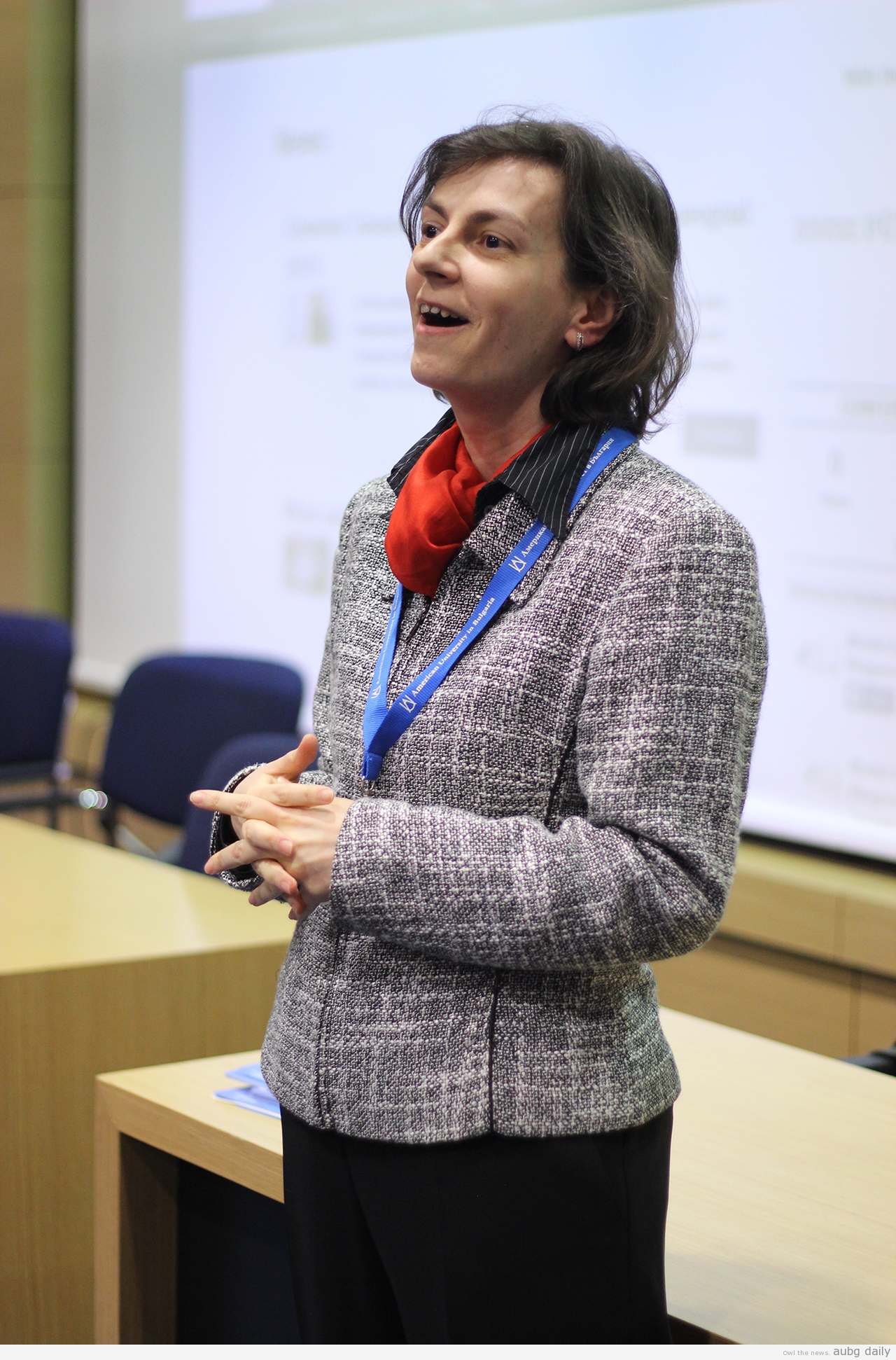 The simulation’s topic was EU’s Migration Policy; a timely issue, triggered by the biggest migration influx since World War II, in the midst of ongoing conflicts, violence, and violation of human rights. Around a 100 participants, half of them non-AUBG students, adopted the roles of officials from the European Parliament (EP), the Council of European Union (CEU), and the European Commission.
According to prof. Cosmina Tanasoiu, Chair of the Department of Politics and European Studies and senior adviser of the conference, apart from its primary goal— simulating the decision-making procedures of those EU institutions—the conference also had a civic and a social role. She is a supporter of such models because they result in “less amateurism and ability to criticize within the legal rules and regulations”.
On the first day of the of the conference, March 27, prof. Tanasoiu held a workshop on the topic of “Functioning of EU Institutions and Current Challenges for Europe.” She talked about lawmaking procedures since the Treaty of Lisbon. Prof. Tanasoiu emphasized the impact of national politics, especially of migration policies of the member states, as well as economic conditions on determining the negotiating positions of European bureaucrats.
“Coming from Italy, a country swamped by migrants, and from Britain, where elections are to take place in a month and there is the UKIP party who favors tight immigration policies and leaving the EU, hint at two contrary positions in Brussels,” Tanasoiu said.
The simulation’s topic was EU’s Migration Policy; a timely issue, triggered by the biggest migration influx since World War II, in the midst of ongoing conflicts, violence, and violation of human rights. Around a 100 participants, half of them non-AUBG students, adopted the roles of officials from the European Parliament (EP), the Council of European Union (CEU), and the European Commission.
According to prof. Cosmina Tanasoiu, Chair of the Department of Politics and European Studies and senior adviser of the conference, apart from its primary goal— simulating the decision-making procedures of those EU institutions—the conference also had a civic and a social role. She is a supporter of such models because they result in “less amateurism and ability to criticize within the legal rules and regulations”.
On the first day of the of the conference, March 27, prof. Tanasoiu held a workshop on the topic of “Functioning of EU Institutions and Current Challenges for Europe.” She talked about lawmaking procedures since the Treaty of Lisbon. Prof. Tanasoiu emphasized the impact of national politics, especially of migration policies of the member states, as well as economic conditions on determining the negotiating positions of European bureaucrats.
“Coming from Italy, a country swamped by migrants, and from Britain, where elections are to take place in a month and there is the UKIP party who favors tight immigration policies and leaving the EU, hint at two contrary positions in Brussels,” Tanasoiu said.
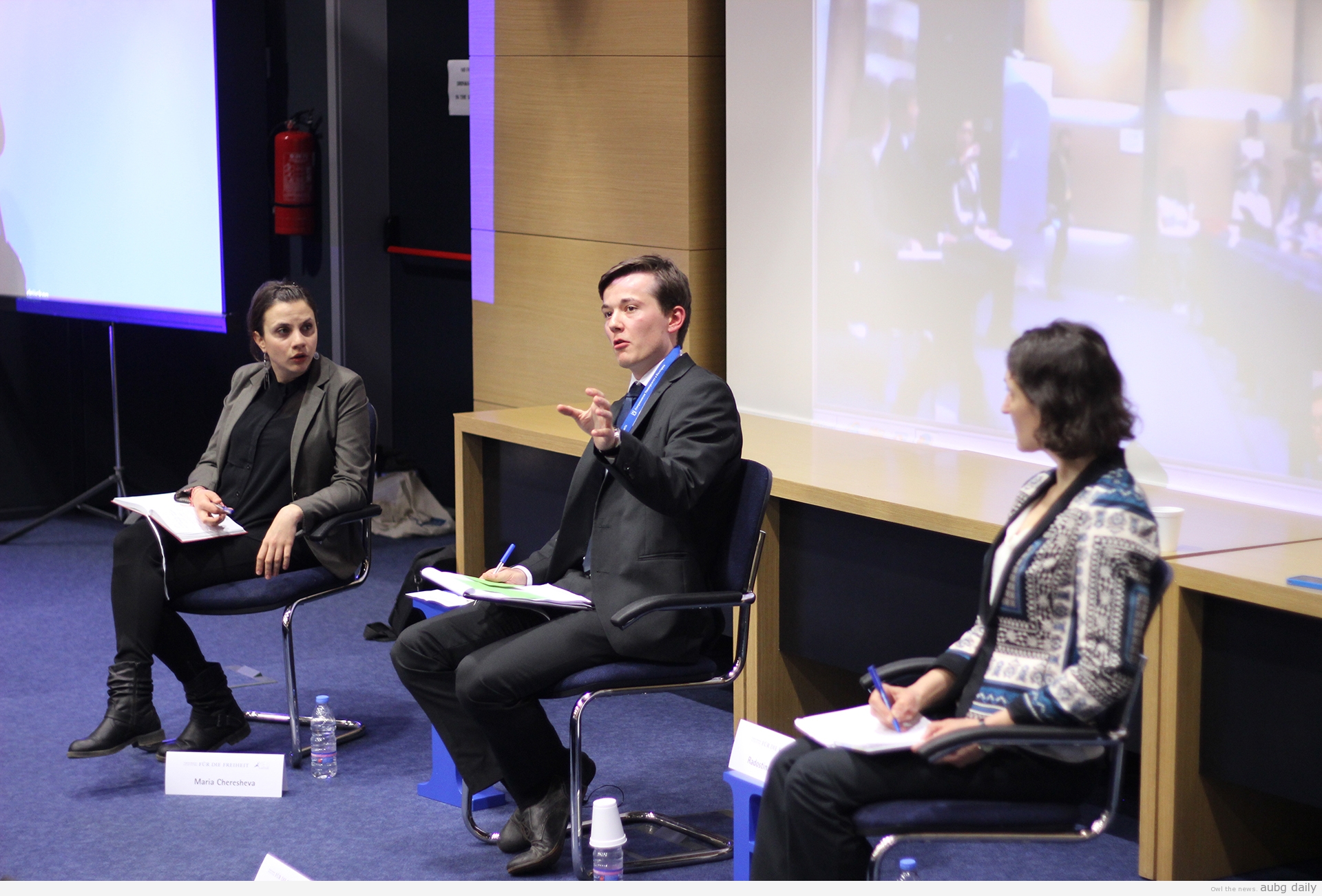 Earlier that day, a panel discussion, arranged by members of the Friedrich Naumann Foundation for Southeastern Europe, took place. Lukas Bieber, a trainee in the organization and an External Affairs Officer in the European Society Club at AUBG, chaired the discussion.
He put an accent on the benefits of a proactive approach with regards to EU’s migration policy. During the discussion, participants were asked to consider a common European asylum system in parts of the EU and specify three key features such a system should include. During a virtual conversation, students had the opportunity to directly address questions to Antoaneta Asenova, political adviser to ALDE and Vice-President of the European parliament.
The sessions of the European Parliament (EP) and the Council of European Union (CEU) started on Saturday, March 28. The European Commission was responsible for drafting a proposal for new legislation on migration. In order for it to pass and for new legislature to come in effect, the EP and the CEU needed to come to an agreement.
The EP was separated into LIBE (Committee on Civil Liberties, Justice and Home Affairs) and EMPL (Employment, Social Affairs & Inclusion). The subtopics discussed were rules for EU Blue Card holders, distributing the burden of immigrants from countries like Italy and Malta, and border control. By the end of the first day, "...the MEPs have had fruitful discussions within the time limits, with some delegates being more active than others since the issues concerned them more gravely," second-year student Hristina Mihaylova said.
Meanwhile in the CEU, the topic was discussed in great detail with divergent opinions springing up. A separation between Continental Europe and border countries like the UK and Denmark occurred. “Countries were attempting to build ties with member states with similar problems”, second-year student who served as a CEU minister, Julia Shirinkina, shared. “Surprisingly, it was during the unmoderated debates that the best arguments were born.”
Earlier that day, a panel discussion, arranged by members of the Friedrich Naumann Foundation for Southeastern Europe, took place. Lukas Bieber, a trainee in the organization and an External Affairs Officer in the European Society Club at AUBG, chaired the discussion.
He put an accent on the benefits of a proactive approach with regards to EU’s migration policy. During the discussion, participants were asked to consider a common European asylum system in parts of the EU and specify three key features such a system should include. During a virtual conversation, students had the opportunity to directly address questions to Antoaneta Asenova, political adviser to ALDE and Vice-President of the European parliament.
The sessions of the European Parliament (EP) and the Council of European Union (CEU) started on Saturday, March 28. The European Commission was responsible for drafting a proposal for new legislation on migration. In order for it to pass and for new legislature to come in effect, the EP and the CEU needed to come to an agreement.
The EP was separated into LIBE (Committee on Civil Liberties, Justice and Home Affairs) and EMPL (Employment, Social Affairs & Inclusion). The subtopics discussed were rules for EU Blue Card holders, distributing the burden of immigrants from countries like Italy and Malta, and border control. By the end of the first day, "...the MEPs have had fruitful discussions within the time limits, with some delegates being more active than others since the issues concerned them more gravely," second-year student Hristina Mihaylova said.
Meanwhile in the CEU, the topic was discussed in great detail with divergent opinions springing up. A separation between Continental Europe and border countries like the UK and Denmark occurred. “Countries were attempting to build ties with member states with similar problems”, second-year student who served as a CEU minister, Julia Shirinkina, shared. “Surprisingly, it was during the unmoderated debates that the best arguments were born.”
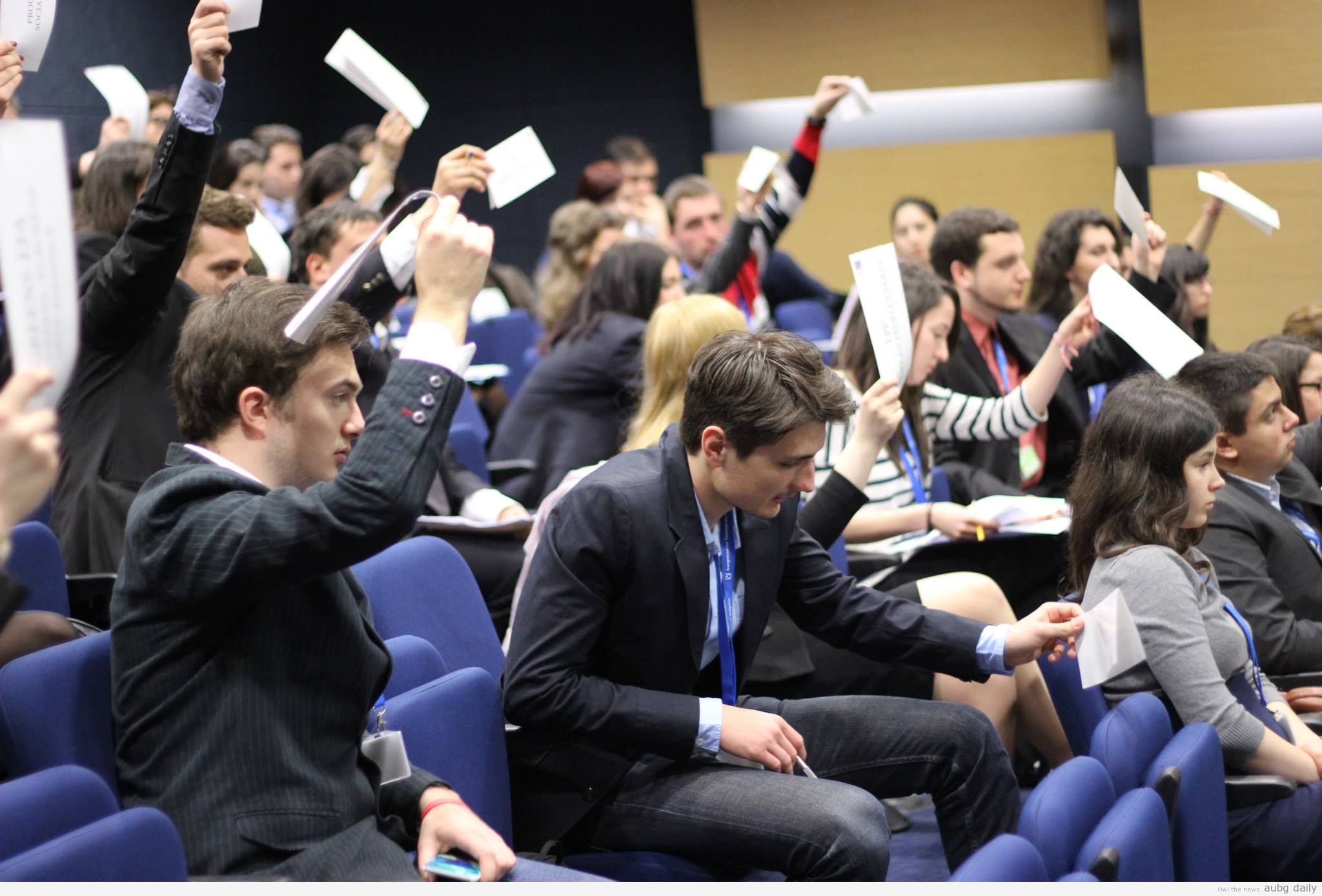 Some students' own views on immigration policies were quite overlapping with the ones of the countries they were representing. However, that was not the case of Lena Stephan, a student from the University of Bremen.
As a representative of the UK, she had to reinforce the state’s tough migration policies. However, her personal opinion on the issue is much more liberal and advocating UK’s position was a challenging task for her. On the other hand, another non-AUBG student, Javier Gamarro González from Spain, was functioning as a MEP from Italy, so “given the similar problems and policies of my home country and Italy, it wasn't a tough job to support its position on migration,” González said.
By the end of the day, the members had to draft a proposal, taking into account all various positions of the member states. During the trialogue meeting between Commissioners, Elected Rapporteurs of the EP and respective Ministers, the ground was given to EP President Nikolay Nikolov, Vice-President Valentina Stefanovic, and CEU President Bojan Mladenovski, all of whom thanked the participants for their expediency and proficiency. Then, they called upon clarifying the redundant articles of the proposal.
Representatives of all the seven parties in the EP: European People’s Party (EPP), The Alliance of Socialists and Democrats (S&D), The Alliance of Liberals and Democrats for Europe, The Free Alliance Greens, The European Conservatives and Reformists, the European United Nordic Green Left, and Europe of Freedom and Democracy spoke on behalf of their party members. They largely agreed with the Commission’s proposal, but their ideological affiliations led to suggestions for different amendments. MEP Maxim Bilevici claimed some 50 percent of the amendments were agreed upon unanimously. “We experienced the typical cleavage between EPP and S&D who were both sticking to their positions,” Bilevici stated.
Some students' own views on immigration policies were quite overlapping with the ones of the countries they were representing. However, that was not the case of Lena Stephan, a student from the University of Bremen.
As a representative of the UK, she had to reinforce the state’s tough migration policies. However, her personal opinion on the issue is much more liberal and advocating UK’s position was a challenging task for her. On the other hand, another non-AUBG student, Javier Gamarro González from Spain, was functioning as a MEP from Italy, so “given the similar problems and policies of my home country and Italy, it wasn't a tough job to support its position on migration,” González said.
By the end of the day, the members had to draft a proposal, taking into account all various positions of the member states. During the trialogue meeting between Commissioners, Elected Rapporteurs of the EP and respective Ministers, the ground was given to EP President Nikolay Nikolov, Vice-President Valentina Stefanovic, and CEU President Bojan Mladenovski, all of whom thanked the participants for their expediency and proficiency. Then, they called upon clarifying the redundant articles of the proposal.
Representatives of all the seven parties in the EP: European People’s Party (EPP), The Alliance of Socialists and Democrats (S&D), The Alliance of Liberals and Democrats for Europe, The Free Alliance Greens, The European Conservatives and Reformists, the European United Nordic Green Left, and Europe of Freedom and Democracy spoke on behalf of their party members. They largely agreed with the Commission’s proposal, but their ideological affiliations led to suggestions for different amendments. MEP Maxim Bilevici claimed some 50 percent of the amendments were agreed upon unanimously. “We experienced the typical cleavage between EPP and S&D who were both sticking to their positions,” Bilevici stated.
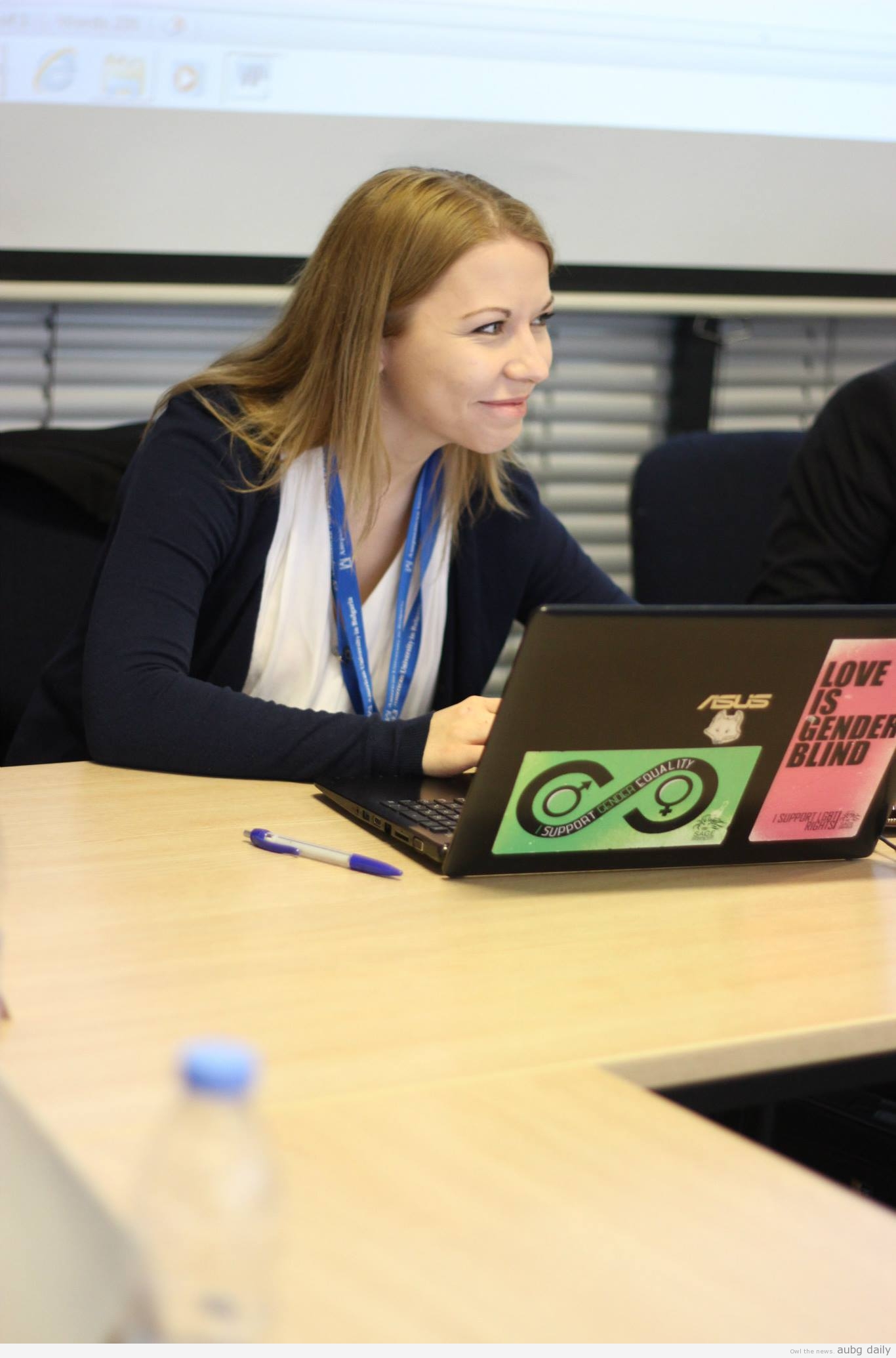 Representatives of the Commission, Victoria Antonova, Gabriela Grebenarska and Alexandra Polibentseva claimed there was overall support for the proposal. By the end of the first day of discussions, they were optimistic about passing new EU Legislation.
On the next day, Sunday, March 29, the outcome of the participants’ labor was presented as a Proposal for a Directive of The European Parliament and of The Council of the European Union on the external dimension of EU immigration policy . It included four titles and twelve articles on the conditions of residence of third-country nationals for the purposes of highly qualified employment, controlling external borders, burden sharing, and general provisions. The proposal passed with a simple majority vote.
During the closing ceremony, in appreciation of her valuable contribution, prof. Tanasoiu received an Appreciation Certificate. Everybody present expressed their gratitude to the organizing team of the European Society Club and certificates for the best delegates were bestowed on Daniel Penev from the CEU and Sava Stoyanov from the EP. Delegates Mohamed Abassor and Jetmira Allushi received honorable mentions for their respective institutions.
Representatives of the Commission, Victoria Antonova, Gabriela Grebenarska and Alexandra Polibentseva claimed there was overall support for the proposal. By the end of the first day of discussions, they were optimistic about passing new EU Legislation.
On the next day, Sunday, March 29, the outcome of the participants’ labor was presented as a Proposal for a Directive of The European Parliament and of The Council of the European Union on the external dimension of EU immigration policy . It included four titles and twelve articles on the conditions of residence of third-country nationals for the purposes of highly qualified employment, controlling external borders, burden sharing, and general provisions. The proposal passed with a simple majority vote.
During the closing ceremony, in appreciation of her valuable contribution, prof. Tanasoiu received an Appreciation Certificate. Everybody present expressed their gratitude to the organizing team of the European Society Club and certificates for the best delegates were bestowed on Daniel Penev from the CEU and Sava Stoyanov from the EP. Delegates Mohamed Abassor and Jetmira Allushi received honorable mentions for their respective institutions.
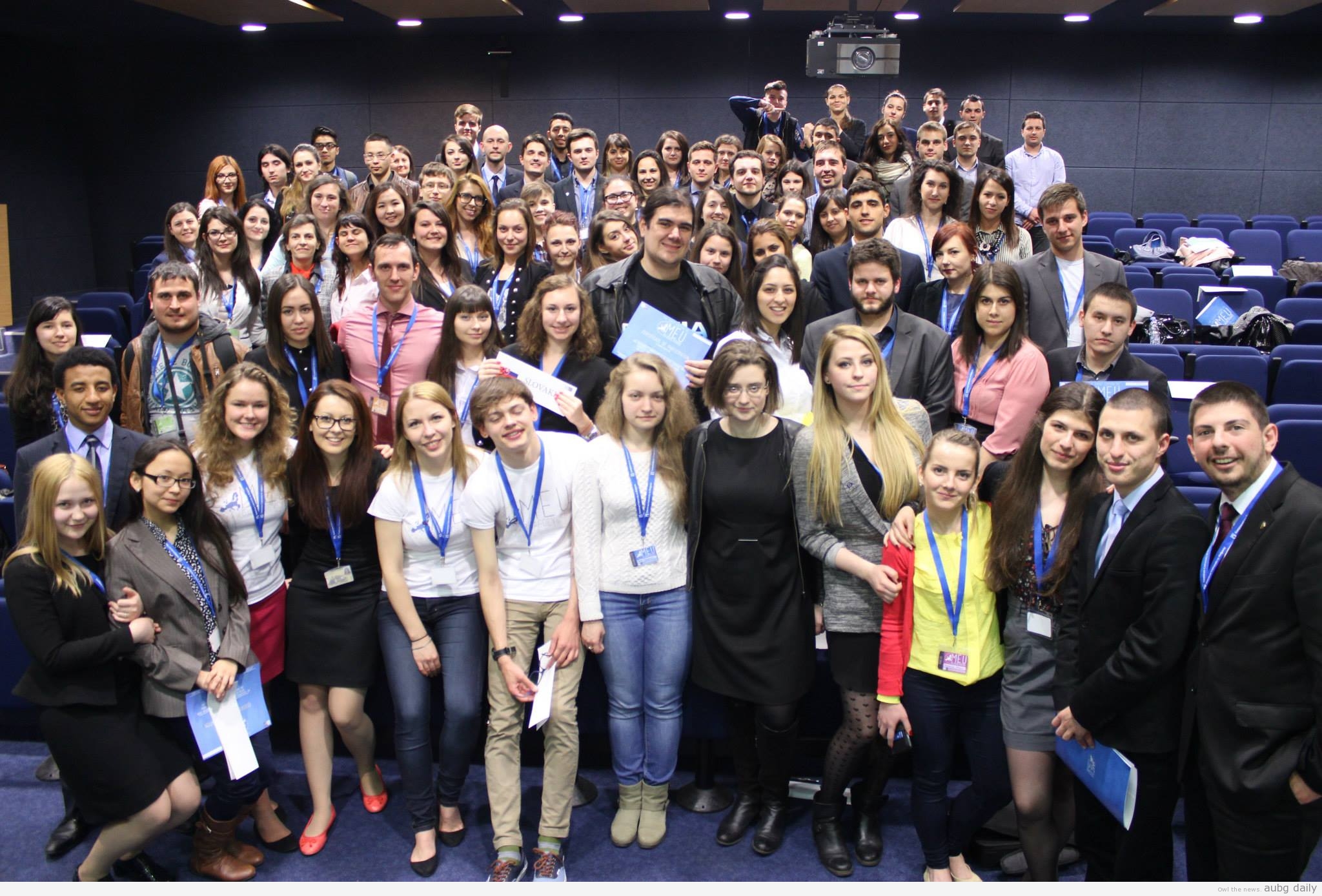 As a whole, participants from AUBG, Southwest University (SWU), Plovdiv University, international students, as well as high-school ones, expressed their satisfaction with the professional organization of the event.
"I highly appreciated the opportunity to assume the role of an EU official and would be glad to participate again next year," a third-year student from SWU Teodora Georgieva, said. She was impressed by the conference's resemblance to the institutions' actual decision-making procedure.
Students in their last year of high school, Radko Nedyalkov and Rumyana Peneva, who are planning to major in Law and/or European Studies said they feel "much more enthusiastic about future professional paths after having gained hands-on experience."
MEU Blagoevgrad 2015 was organized by the European Society Club , AUBG, the Department of Politics and European Studies (prof. Tanasoiu, and prof. Crombois), Student Government at AUBG, Friedrich Naumann Foundation, European Info Center “Europe Direct” Blagoevgrad, the European Parliament’s Information Bureau in Bulgaria, and Orange travel agency.
Photos are courtesy of AUBG Daily's Owl Anna Bashuk.
As a whole, participants from AUBG, Southwest University (SWU), Plovdiv University, international students, as well as high-school ones, expressed their satisfaction with the professional organization of the event.
"I highly appreciated the opportunity to assume the role of an EU official and would be glad to participate again next year," a third-year student from SWU Teodora Georgieva, said. She was impressed by the conference's resemblance to the institutions' actual decision-making procedure.
Students in their last year of high school, Radko Nedyalkov and Rumyana Peneva, who are planning to major in Law and/or European Studies said they feel "much more enthusiastic about future professional paths after having gained hands-on experience."
MEU Blagoevgrad 2015 was organized by the European Society Club , AUBG, the Department of Politics and European Studies (prof. Tanasoiu, and prof. Crombois), Student Government at AUBG, Friedrich Naumann Foundation, European Info Center “Europe Direct” Blagoevgrad, the European Parliament’s Information Bureau in Bulgaria, and Orange travel agency.
Photos are courtesy of AUBG Daily's Owl Anna Bashuk.
 The simulation’s topic was EU’s Migration Policy; a timely issue, triggered by the biggest migration influx since World War II, in the midst of ongoing conflicts, violence, and violation of human rights. Around a 100 participants, half of them non-AUBG students, adopted the roles of officials from the European Parliament (EP), the Council of European Union (CEU), and the European Commission.
According to prof. Cosmina Tanasoiu, Chair of the Department of Politics and European Studies and senior adviser of the conference, apart from its primary goal— simulating the decision-making procedures of those EU institutions—the conference also had a civic and a social role. She is a supporter of such models because they result in “less amateurism and ability to criticize within the legal rules and regulations”.
On the first day of the of the conference, March 27, prof. Tanasoiu held a workshop on the topic of “Functioning of EU Institutions and Current Challenges for Europe.” She talked about lawmaking procedures since the Treaty of Lisbon. Prof. Tanasoiu emphasized the impact of national politics, especially of migration policies of the member states, as well as economic conditions on determining the negotiating positions of European bureaucrats.
“Coming from Italy, a country swamped by migrants, and from Britain, where elections are to take place in a month and there is the UKIP party who favors tight immigration policies and leaving the EU, hint at two contrary positions in Brussels,” Tanasoiu said.
The simulation’s topic was EU’s Migration Policy; a timely issue, triggered by the biggest migration influx since World War II, in the midst of ongoing conflicts, violence, and violation of human rights. Around a 100 participants, half of them non-AUBG students, adopted the roles of officials from the European Parliament (EP), the Council of European Union (CEU), and the European Commission.
According to prof. Cosmina Tanasoiu, Chair of the Department of Politics and European Studies and senior adviser of the conference, apart from its primary goal— simulating the decision-making procedures of those EU institutions—the conference also had a civic and a social role. She is a supporter of such models because they result in “less amateurism and ability to criticize within the legal rules and regulations”.
On the first day of the of the conference, March 27, prof. Tanasoiu held a workshop on the topic of “Functioning of EU Institutions and Current Challenges for Europe.” She talked about lawmaking procedures since the Treaty of Lisbon. Prof. Tanasoiu emphasized the impact of national politics, especially of migration policies of the member states, as well as economic conditions on determining the negotiating positions of European bureaucrats.
“Coming from Italy, a country swamped by migrants, and from Britain, where elections are to take place in a month and there is the UKIP party who favors tight immigration policies and leaving the EU, hint at two contrary positions in Brussels,” Tanasoiu said.
 Earlier that day, a panel discussion, arranged by members of the Friedrich Naumann Foundation for Southeastern Europe, took place. Lukas Bieber, a trainee in the organization and an External Affairs Officer in the European Society Club at AUBG, chaired the discussion.
He put an accent on the benefits of a proactive approach with regards to EU’s migration policy. During the discussion, participants were asked to consider a common European asylum system in parts of the EU and specify three key features such a system should include. During a virtual conversation, students had the opportunity to directly address questions to Antoaneta Asenova, political adviser to ALDE and Vice-President of the European parliament.
The sessions of the European Parliament (EP) and the Council of European Union (CEU) started on Saturday, March 28. The European Commission was responsible for drafting a proposal for new legislation on migration. In order for it to pass and for new legislature to come in effect, the EP and the CEU needed to come to an agreement.
The EP was separated into LIBE (Committee on Civil Liberties, Justice and Home Affairs) and EMPL (Employment, Social Affairs & Inclusion). The subtopics discussed were rules for EU Blue Card holders, distributing the burden of immigrants from countries like Italy and Malta, and border control. By the end of the first day, "...the MEPs have had fruitful discussions within the time limits, with some delegates being more active than others since the issues concerned them more gravely," second-year student Hristina Mihaylova said.
Meanwhile in the CEU, the topic was discussed in great detail with divergent opinions springing up. A separation between Continental Europe and border countries like the UK and Denmark occurred. “Countries were attempting to build ties with member states with similar problems”, second-year student who served as a CEU minister, Julia Shirinkina, shared. “Surprisingly, it was during the unmoderated debates that the best arguments were born.”
Earlier that day, a panel discussion, arranged by members of the Friedrich Naumann Foundation for Southeastern Europe, took place. Lukas Bieber, a trainee in the organization and an External Affairs Officer in the European Society Club at AUBG, chaired the discussion.
He put an accent on the benefits of a proactive approach with regards to EU’s migration policy. During the discussion, participants were asked to consider a common European asylum system in parts of the EU and specify three key features such a system should include. During a virtual conversation, students had the opportunity to directly address questions to Antoaneta Asenova, political adviser to ALDE and Vice-President of the European parliament.
The sessions of the European Parliament (EP) and the Council of European Union (CEU) started on Saturday, March 28. The European Commission was responsible for drafting a proposal for new legislation on migration. In order for it to pass and for new legislature to come in effect, the EP and the CEU needed to come to an agreement.
The EP was separated into LIBE (Committee on Civil Liberties, Justice and Home Affairs) and EMPL (Employment, Social Affairs & Inclusion). The subtopics discussed were rules for EU Blue Card holders, distributing the burden of immigrants from countries like Italy and Malta, and border control. By the end of the first day, "...the MEPs have had fruitful discussions within the time limits, with some delegates being more active than others since the issues concerned them more gravely," second-year student Hristina Mihaylova said.
Meanwhile in the CEU, the topic was discussed in great detail with divergent opinions springing up. A separation between Continental Europe and border countries like the UK and Denmark occurred. “Countries were attempting to build ties with member states with similar problems”, second-year student who served as a CEU minister, Julia Shirinkina, shared. “Surprisingly, it was during the unmoderated debates that the best arguments were born.”
 Some students' own views on immigration policies were quite overlapping with the ones of the countries they were representing. However, that was not the case of Lena Stephan, a student from the University of Bremen.
As a representative of the UK, she had to reinforce the state’s tough migration policies. However, her personal opinion on the issue is much more liberal and advocating UK’s position was a challenging task for her. On the other hand, another non-AUBG student, Javier Gamarro González from Spain, was functioning as a MEP from Italy, so “given the similar problems and policies of my home country and Italy, it wasn't a tough job to support its position on migration,” González said.
By the end of the day, the members had to draft a proposal, taking into account all various positions of the member states. During the trialogue meeting between Commissioners, Elected Rapporteurs of the EP and respective Ministers, the ground was given to EP President Nikolay Nikolov, Vice-President Valentina Stefanovic, and CEU President Bojan Mladenovski, all of whom thanked the participants for their expediency and proficiency. Then, they called upon clarifying the redundant articles of the proposal.
Representatives of all the seven parties in the EP: European People’s Party (EPP), The Alliance of Socialists and Democrats (S&D), The Alliance of Liberals and Democrats for Europe, The Free Alliance Greens, The European Conservatives and Reformists, the European United Nordic Green Left, and Europe of Freedom and Democracy spoke on behalf of their party members. They largely agreed with the Commission’s proposal, but their ideological affiliations led to suggestions for different amendments. MEP Maxim Bilevici claimed some 50 percent of the amendments were agreed upon unanimously. “We experienced the typical cleavage between EPP and S&D who were both sticking to their positions,” Bilevici stated.
Some students' own views on immigration policies were quite overlapping with the ones of the countries they were representing. However, that was not the case of Lena Stephan, a student from the University of Bremen.
As a representative of the UK, she had to reinforce the state’s tough migration policies. However, her personal opinion on the issue is much more liberal and advocating UK’s position was a challenging task for her. On the other hand, another non-AUBG student, Javier Gamarro González from Spain, was functioning as a MEP from Italy, so “given the similar problems and policies of my home country and Italy, it wasn't a tough job to support its position on migration,” González said.
By the end of the day, the members had to draft a proposal, taking into account all various positions of the member states. During the trialogue meeting between Commissioners, Elected Rapporteurs of the EP and respective Ministers, the ground was given to EP President Nikolay Nikolov, Vice-President Valentina Stefanovic, and CEU President Bojan Mladenovski, all of whom thanked the participants for their expediency and proficiency. Then, they called upon clarifying the redundant articles of the proposal.
Representatives of all the seven parties in the EP: European People’s Party (EPP), The Alliance of Socialists and Democrats (S&D), The Alliance of Liberals and Democrats for Europe, The Free Alliance Greens, The European Conservatives and Reformists, the European United Nordic Green Left, and Europe of Freedom and Democracy spoke on behalf of their party members. They largely agreed with the Commission’s proposal, but their ideological affiliations led to suggestions for different amendments. MEP Maxim Bilevici claimed some 50 percent of the amendments were agreed upon unanimously. “We experienced the typical cleavage between EPP and S&D who were both sticking to their positions,” Bilevici stated.
 Representatives of the Commission, Victoria Antonova, Gabriela Grebenarska and Alexandra Polibentseva claimed there was overall support for the proposal. By the end of the first day of discussions, they were optimistic about passing new EU Legislation.
On the next day, Sunday, March 29, the outcome of the participants’ labor was presented as a Proposal for a Directive of The European Parliament and of The Council of the European Union on the external dimension of EU immigration policy . It included four titles and twelve articles on the conditions of residence of third-country nationals for the purposes of highly qualified employment, controlling external borders, burden sharing, and general provisions. The proposal passed with a simple majority vote.
During the closing ceremony, in appreciation of her valuable contribution, prof. Tanasoiu received an Appreciation Certificate. Everybody present expressed their gratitude to the organizing team of the European Society Club and certificates for the best delegates were bestowed on Daniel Penev from the CEU and Sava Stoyanov from the EP. Delegates Mohamed Abassor and Jetmira Allushi received honorable mentions for their respective institutions.
Representatives of the Commission, Victoria Antonova, Gabriela Grebenarska and Alexandra Polibentseva claimed there was overall support for the proposal. By the end of the first day of discussions, they were optimistic about passing new EU Legislation.
On the next day, Sunday, March 29, the outcome of the participants’ labor was presented as a Proposal for a Directive of The European Parliament and of The Council of the European Union on the external dimension of EU immigration policy . It included four titles and twelve articles on the conditions of residence of third-country nationals for the purposes of highly qualified employment, controlling external borders, burden sharing, and general provisions. The proposal passed with a simple majority vote.
During the closing ceremony, in appreciation of her valuable contribution, prof. Tanasoiu received an Appreciation Certificate. Everybody present expressed their gratitude to the organizing team of the European Society Club and certificates for the best delegates were bestowed on Daniel Penev from the CEU and Sava Stoyanov from the EP. Delegates Mohamed Abassor and Jetmira Allushi received honorable mentions for their respective institutions.
 As a whole, participants from AUBG, Southwest University (SWU), Plovdiv University, international students, as well as high-school ones, expressed their satisfaction with the professional organization of the event.
"I highly appreciated the opportunity to assume the role of an EU official and would be glad to participate again next year," a third-year student from SWU Teodora Georgieva, said. She was impressed by the conference's resemblance to the institutions' actual decision-making procedure.
Students in their last year of high school, Radko Nedyalkov and Rumyana Peneva, who are planning to major in Law and/or European Studies said they feel "much more enthusiastic about future professional paths after having gained hands-on experience."
MEU Blagoevgrad 2015 was organized by the European Society Club , AUBG, the Department of Politics and European Studies (prof. Tanasoiu, and prof. Crombois), Student Government at AUBG, Friedrich Naumann Foundation, European Info Center “Europe Direct” Blagoevgrad, the European Parliament’s Information Bureau in Bulgaria, and Orange travel agency.
Photos are courtesy of AUBG Daily's Owl Anna Bashuk.
As a whole, participants from AUBG, Southwest University (SWU), Plovdiv University, international students, as well as high-school ones, expressed their satisfaction with the professional organization of the event.
"I highly appreciated the opportunity to assume the role of an EU official and would be glad to participate again next year," a third-year student from SWU Teodora Georgieva, said. She was impressed by the conference's resemblance to the institutions' actual decision-making procedure.
Students in their last year of high school, Radko Nedyalkov and Rumyana Peneva, who are planning to major in Law and/or European Studies said they feel "much more enthusiastic about future professional paths after having gained hands-on experience."
MEU Blagoevgrad 2015 was organized by the European Society Club , AUBG, the Department of Politics and European Studies (prof. Tanasoiu, and prof. Crombois), Student Government at AUBG, Friedrich Naumann Foundation, European Info Center “Europe Direct” Blagoevgrad, the European Parliament’s Information Bureau in Bulgaria, and Orange travel agency.
Photos are courtesy of AUBG Daily's Owl Anna Bashuk.
